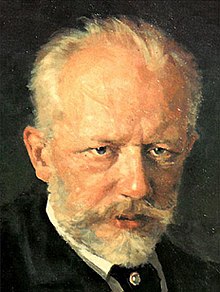The Seasons (Tchaikovsky)
| The Seasons | |
|---|---|
| by Pyotr Ilyich Tchaikovsky | |

Portrait of Pyotr Ilyich Tchaikovsky by Nikolai Dimitriyevich Kuznetsov
|
|
| Native name | Времена года |
| Catalogue | Op. 37a, Op. 37b |
| Genre | Piano suite |
| Movements | 12 |
The Seasons, Op. 37a (also seen as Op. 37b; Russian: Времена года; published with the French title Les Saisons), is a set of twelve short character pieces for solo piano by the Russian composer Pyotr Ilyich Tchaikovsky. Each piece is the characteristic of a different month of the year in the northern hemisphere. The work is also sometimes heard in orchestral and other arrangements by other hands. Individual excerpts have always been popular – Troika (November) was a favourite encore of Sergei Rachmaninoff, and Barcarolle (June) was enormously popular and appeared in numerous arrangements (for orchestra, violin, cello, clarinet, harmonium, guitar and even mandolin).
The Seasons was commenced shortly after the premiere of Tchaikovsky's First Piano Concerto, and continued while he was completing his first ballet, Swan Lake.
In 1875, Nikolay Matveyevich Bernard, the editor of the St. Petersburg music magazine Nouvellist, commissioned Tchaikovsky to write 12 short piano pieces, one for each month of the year. Bernard suggested a subtitle for each month's piece. Tchaikovsky accepted the commission and all of Bernard's subtitles, and in the December 1875 edition of the magazine, readers were promised a new Tchaikovsky piece each month throughout 1876. The January and February pieces were written in late 1875 and sent to Bernard in December, with a request for some feedback as to whether they were suitable, and if not, Tchaikovsky would rewrite February and ensure the remainder were in the style Bernard was after. March, April and May appear to have been composed separately; however the remaining seven pieces were all composed at the same time and written in the same copybook, and evidence suggests they were written between 22 April and 27 May. The orchestration of Swan Lake was finished by 22 April, leaving the composer free to focus on other music; and he left for abroad at the end of May. This seems to put the lie to Nikolay Kashkin's published version of events, which was that each month the composer would sit down to write a single piece, but only after being reminded to do so by his valet.
...
Wikipedia
